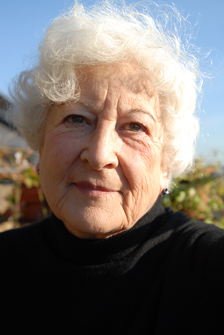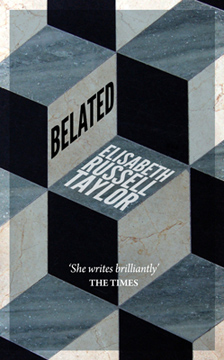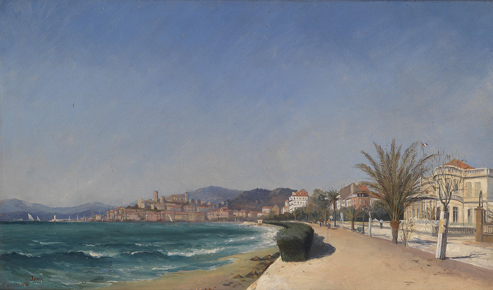The meaning
by Elisabeth Russell TaylorMy God, I’m bored! Maurice Levine dawdled along Hempstead Gardens towards home, a journey he had been making every day for over fifty-five years, ever since his marriage to Gina Jacobs. The appearance of number 16, identical to every other house in Hempstead Gardens, was the one sight he could rely upon to arouse in him instantaneous feelings of boredom, loneliness and entrapment.
“Gina! I’m home.”
“How’s it been?” she asked, backing into the kitchen to pour boiling water over the tea bag. Maurice lifted his right arm to hang his coat on the stand and with his left hand removed the Standard from the pocket. He mooched into the lounge, crossing to the bay window, where he fingered the claret velour curtain while he stared out on to thirty feet of grass bordered by identical beds of flowers whose names he neither knew nor cared to know.
Gina placed the glass of lemon tea on a plastic mat with a picture of the Knesset on one side and the Mount of Olives on the other.
“Take care!” she said, as she always did. “Hungry?” she asked, as always, and not waiting for an answer added, “I’ve got a nice fowl in lemon sauce.”
Maurice had no reason to attend to details of the menu: he knew it by heart, oh yes! Instead, he turned from the window and stationed himself in front of the glass-fronted bookcase with its single, undisturbed row of books: English classics of even size, bound in navy Morocco. The set had been a Bar Mitzvah present to his son Aubrey.
Maurice remembered that day. It had cost him a bomb. Gina had insisted on a four-course menu and French wines… and she would not have the reception in the synagogue hall. She insisted on somewhere ‘up west’. “It’s more convenient for the people,” she said. It hadn’t been.
He would have liked Aubrey to be a doctor or a lawyer. A property developer in Westchester County was one up on estate agenting in north London, but it did not impress Maurice as much as he pretended to his friend Solly.
The button and braid business keeps you on the go fifty weeks a year – fifty-two, if the workers hadn’t insisted… When could I have read books?”
“He’s a lot better off than he would have been staying here. He’s got a fine place with a tennis court…” But the boy had never studied. It was the same with Linda. She’d been a good girl to her mother and she was a respected fundraiser, but what’s a secretary, tell me that? He hadn’t liked to ask. Once or twice when the conversation veered towards the subject, Gina turned away and took a shtum powder.
No one’s so much as touched those books, let alone leafed through their pages, Maurice thought while he gulped his tea noisily. The whole of England may be summed up there and I’ll never know.
“Gina! Gina! Come here a moment. Tell me, how many books have you read in your life?”
“What a question! Don’t bother me now with your questions. I’ve got the matzos kleis on the simmer.”
It’s certainly all in books, Maurice mused. I never had the chance to find out for myself… I never got the time. The button and braid business keeps you on the go fifty weeks a year – fifty-two, if the workers hadn’t insisted… And he thought back to his own holidays. As soon as he had been able to afford it – it had meant foregoing a Rover and keeping the old Vauxhall far too long – he had taken his two weeks in the south of France. Every year they had gone to the same comfortable hotel in Cannes, with Solly and Ruth. He remembered sitting on the terrace of the hotel in the sun watching the lovely young, slim, scantily dressed ladies go by. Better than reading any day, he had thought at the time. And what other time had he had? Once Aubrey had married and left for the States they had gone there for the Easter break. Where’s the time gone? Monday to Friday, eight to eight, driving to and from the city, stuck in traffic, synagogue on Saturday mornings. Linda and that husband of hers for lunch. I wish she’d married one of the other boys. A show with Solly and Ruth or Becky and Gordon in the evening. And then on Sunday, the papers, a nice sleep in the afternoon in front of the TV and before you knew it, it was Monday again. When could I have read books? The trouble is – and of this he was quite sure – it was all there in books: the Meaning. It’s the Meaning that’s escaped me, he lamented.
“Gina!” he called out. “Gina, does Linda read books?”
“Such questions. How should I know? Why don’t you ask her yourself?”
Maurice sighed. “I should never have retired. I was better off working.”
“You may have been better off,” his wife allowed, “but you would have been dead better off.” She was standing at his side, duster in hand, waiting to mop up the tea he was bound to spill. “You know what Dr Foreman said, he said ‘rest’. He said your heart wouldn’t stand the pace you set it.”
“I’m bored, Gina. The other men play golf all day and bridge all night. They don’t want me around. I’ve got no interests. I worked all my life since I was fifteen. I’ve not had the time. It’s different for you: you’ve got the house and the garden and Linda…”
And much too much else to sit and listen to your kvetching, his wife thought.
Maurice did not know how to fill the lines of time between the stops for meals. He was like a dog, wandering aimlessly, unable to settle for long in one place but not liking any of the alternatives better. “Maybe I should buy a dog to take me walkies.”
Gina expressed her disapproval by ignoring this reflection.
It was warm and soft in bed. Maurice put his arms round his wife. The flesh of his stomach met that of her buttocks. Now he felt at peace.
“D’you mind, Gina?”
“Go ahead!” And he did. In silence. His mind drifted in the exquisite pleasure that was his own. This was what he had to live for. Filled with the matchless delight this experience occasioned in him, he ceased thinking, consumed by a single sensation. Unaware of its primacy, however, he made no attempt to prolong it. This he regretted when, spent, he rolled on to his back and faced the terrifying fact that this was his sole pleasure in life. I could have kept it up a bit longer, he mused. I’ll try next time.
But when Maurice woke at 6.30 next morning, Gina was up. After fifty-five years of preparing his breakfast for 7.30, she had not accustomed herself to the new circumstance.
Oh my God! he thought. Another dull, brown day.
“There’s a couple of rollmops to finish and some soured cream in the fridge. Save the tinfoil… And there’s some fruit wanting finishing in the Pyrex bowl. I’m going up to Brent Cross with Linda to look at microwave ovens.”
Maurice did not feel inclined to picnic at the corner of the kitchen table. He felt the edges of the abyss crumbling. He needed to get out before they fell in on him.
The ninety days before he could remove his savings would give him the time he needed to draw up foolproof plans. There were only two routes out of his desolation.”
He wandered into Golders Green Road and looked aimlessly into shop windows. He could not help noticing the new Rover in the showroom. He had always wanted a Rover. He wondered whether, if he knocked on Mr Klein’s door, the dentist might fit him in? He’d been meaning to do something about that broken back tooth. He’d call in at the bank and see how much he had in his current account. Then, passing the salt beef bar, the idea of a sandwich occurred to him.
He drew himself onto a bar stool at the counter. The man in the white coat cutting the beef might pass the time of day. But the man was too busy slicing. Maurice stared at the jars of pickled cucumber and the tins of olives, chewing on a sandwich he no longer fancied, unable to gather his melancholy thoughts. Why was he feeling so low? Perhaps it was medical. Perhaps he should find a specialist. Maybe it was his heart. Before he had the opportunity to develop that line of thinking, however, he was relieved by a diversion: raised voices at a table just behind him, a little to the right. A petulant child was driving his parents mad. Without turning to see, Maurice strained to hear what was going on.
“Drink your lemonade!”
“Don’t want to.” The child sounded plaintive. Maurice could not resist the temptation. He turned. The child – a boy of about six – was starting to cry. Real tears. He was gulping down sobs. His nose was running.
“Drink your lemonade!” his father shouted again.
“Don’t make him do what he doesn’t want to do, dear,” the young mother pleaded softly, placing her hand over her husband’s. Maurice saw she hadn’t a chance of influencing the man. He was scarlet in the face. He was ready to explode.
“He can’t go through life doing what he wants!” the father shouted. “Take me! Have I ever done what I wanted?”
His mouth filled with salt beef and rye, Maurice found himself having to concentrate to swallow. He was not enjoying this sandwich. He slid off the stool, took his wallet from his back trouser pocket and paid at the till. As he slipped back into Golders Green Road, he found himself muttering aloud, “Never done a thing he wanted in all his life. Like me. I’ve never done what I wanted. Never!”
He did not have to consider where he was going. His feet did the thinking for him. There, in the newsagents, he sorted through the shelves until he came to the sports section. He picked out the Racing News, the Racing Times, the Racing Gazette, the lot. A frisson of excitement shot through him as he felt the thick, warm bundle under his arm press against his side.
“Gina! I’m home!”
“How’s it been?”
“Fine. Just fine.”
Gina appeared not to hear the more optimistic note in her husband’s voice. Calling from the kitchen, she informed him that Linda had bought a microwave.
“And for your information, she says to tell you she’s been reading books all her life.”
“Did she say what she got from them?”
“No. But I can’t say I enquired.”
“Gina was at his side, setting down his lemon tea. “I hope you’re not thinking of doing the horses,” she said ominously, noticing the pile of racing papers. “We can’t afford that.” Looking at him intently, “You’ve always had that hankering, haven’t you?” Receiving neither confirmation nor denial: “You know what Father said before he gave his consent: ‘No horses, not if it’s my daughter you want.’ He only gave us the house because you promised. So don’t you go starting now he’s gone.” And she turned on her heel and went back into the kitchen.
He thought the ninety days before he could remove his savings from his building society account would give him the time he needed to draw up foolproof plans. There were only two routes out of his desolation. Both brought him out in sweats and palpitations but things couldn’t go on the way they were. He could play the horses and if he won he could disappear. He had seen a programme on TV and read two accounts in the papers of men – quite important figures – who had done this: left the house to buy a packet of cigarettes and never been seen since. He’d lay his plans very carefully, make it seem he was dead. He’d disappear to the south of France and find himself one of those slim, bronzed young ladies.
And if he lost? A lump formed in his throat. He could hardly breathe. Well, in that case he’d have to end it all. Gina would have the house; it was hers, after all. And she’d have the pension.
***
It was a peculiar peace that descended on him when he left the bookies in Golders Green Road for the last time, his wallet empty, his pockets too. Well, he said to himself, at least I did something I wanted to do. The familiar, brown, tired wave of boredom broke over him. The bronzed young lady on the promenade disappeared in the undertow. The peace of oblivion dissolved. Everything was back where it had been. Risk-free. The menu would be the same, the words exchanged would be the same. The routine… The English classics in their navy Morocco bindings would stay forever unopened behind their glass doors.
Maurice found it an effort to put one foot down in front of the other as he climbed the stairs to bed. Gina was rubbing cold cream into her face. While she fixed a hairnet over her newly permed, dyed blonde hair, she watched Maurice through the looking-glass on her kidney-shaped dressing table.
“Fold your trousers over the chair! Don’t just drop them on the floor. How many times… Really!” Everything was happening in agonisingly slow motion. In his mind he heard the thundering finality of doors shutting out the thrill of what might have been.
Gina hung her eau-de-Nil candlewick dressing-gown on the hook behind the door and kicked off her mules. She was getting into bed. She had her back to him. When he slipped in bed beside her she was turning off the bedside light and settling down to sleep.
Maurice moved into position.
“D’you mind, Gina?”
“Go ahead,” she replied.
From the new collection Belated, published by Kimblewood Press. ‘The Meaning’ was first published in The Moth.
 Elisabeth Russell Taylor is the author of six novels, including the Virago Modern Classics In a Summer Season and Pillion Riders, and three short-story collections. She has also written for children and published numerous articles and reviews. She lives in London.
Elisabeth Russell Taylor is the author of six novels, including the Virago Modern Classics In a Summer Season and Pillion Riders, and three short-story collections. She has also written for children and published numerous articles and reviews. She lives in London.
elisabethrusselltaylor.wordpress.com



